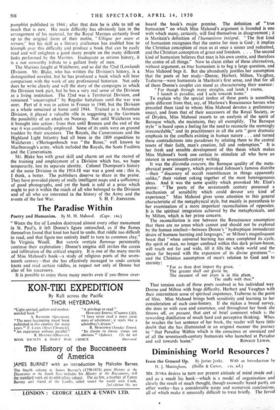Diminishing World Resources ?
From the Ground Up. By Jorian Jenks. With an Introduction by MR. JENKS desires to turn our present attitude of mind inside out ; and as a result his book—which is a model of organisation and clearly the result of much thought, though avowedly based partly on other works—has a considerable scope and numerous conclusions, all of which make it unusually difficult to treat briefly. The fervid introduction by Mr. H. J. Massingham will recommend the book to some and irritate others. This introduction, and the opening chapters, aroused my instinctive hostility ; but my sympathies changed as the theme unfolded.
Baldly, the book is a survey of Western civilisation in its relation to .agriculture during the last few centuries, followed by an assess- ment of and solutions for the present situation ; it puts the case for true economy versus false economics, and pleads against the outlook which regards the farm as a factory. In a relentless, closely reasoned argument Mr. Jenks points out how the world's resources, the tapping of • which made for so much apparent progress and expansion in the recent past, are now drying up and, after exploita- tion, actually diminishing. No longer can " capture " take the place of culture ; plants and animals must be cultivated to yield a recurring reproductive surplus. We have harvested where we have not sown, and must now face the inevitable consequences.
Science has given us cultivating machines and chemical fertilisers which have been used without any thought for the corresponding warnings that the stability of the soil must be maintained even more scrupulously than its food content. Parallel with this, industrialisa- tion has reduced the status of the worker, who now has little initiative, little satisfaction in work done, and only an artificial security, resulting in a frustratitm dulled by the doubtful palliatives of modern mass entertainment. Man has become over-confident and out of touch with necessity ; society is aimless and lacking in organic cohesion ; money is the key commodity and driving force of the age. Society has become so preoccupied with other matters that it has " neglected, exploited and even despised " agriculture— its very foundation which is now creaking ominously.
Mr. Jenks's picture, then, is of civilisation on the decline, with the accessories of life considered more important than life itself, with man and society in a mechanist state of mind, and the precious few inches of soil which are our sustenance in the balance. In this situation he exhorts us to consider our own resources as the starting- point and self-sufficiency as the aim. To achieve this, " more ruralisation of population and industries " is required, not the reverse ; and his plans to that end, though too detailed to expand here, are in many ways excellent. They are, moreover, designed to give the worker more real satisfaction and responsibility. The process recommended might, in fact, reduce Britain to a minor State, but we are assured that Britain could still demonstrate her leadership. The conclusions are far from impracticable ; but would modern man ever consider them seriously ? In his preoccupation with capital on the one hand and atomic fission and worse on the other, man as a whole has refused to grasp that there will quite shortly be a violent collision between the insufficiencies of food resources and the demands of a population increasing rapidly in numbers and life expectancy. The book has a real merit which this necessarily terse outline may have concealed. Apart from a profusion of penetrating, almost aphoristic, statements, the handling of the material, particularly the ecology of man and soil, the functions of money, and the arguments against overseas trade, is masterly. The one thing that seems to be lacking throughout is any appreciation that many of the ills of the past and much of our present trouble are due to the insensate increases in population. In many ways the book would be greatly improved if it was only a ,hird of its present length. With an introductory chapter the last part of the book, which asks and answers the questions that the present situation demands, would be almost adequate. Indeed, some statements in the early part of the book, unassociated with final conclusions, may give a mistaken idea of the author's intentions. And I am sure that far more people would read the book if it were shorter and written with a more popular appeal. As it is, it will probably be read mainly by those already in sympathy with the " cause," while it should be studied by our rulers and their planners, by economists, and by you and me.
A. J. HUXLEY.







































 Previous page
Previous page